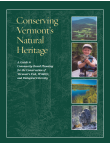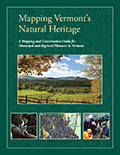
The Community Wildlife Program (CWP) provides municipal planners and non-governmental organizations with the most up-to-date information on conservation science and resources for implementing their conservation projects.
The program helps towns take their community’s conservation goals, use them to identify important wildlife habitat, and translate these goals into language that can use be used in their town plans.
Contact Us
To schedule a consultation with a conservation biologist, email Jens Hilke or call 802-461-6791.The consultations and any follow up services are free of charge and are sponsored by the Vermont Fish & Wildlife Department.
Services CWP Provides
The Community Wildlife Program offers a number of free services to towns and nongovernmental organizations.
Finding Information
There is a lot of natural resource data available to towns, and program staff will help you determine what type(s) of data you need, where to get it, and how to interpret the data.
Reviewing Town Planning Documents
Whether your town is rewriting its town plan, zoning ordinances or sub-division regulations, program staff can review these documents and provide suggestions to ensure the language meets your goals.
Access to Other Resources or Project Partners
The program can help you find organizations to partner with for funding or additional services to help with the implementation of your conservation projects.
Changing the Scale
Because the program offers technical assistance statewide, staff are likely working with your neighbors and are familiar with conservation planning on a larger, regional level. The program can review your projects and help you integrate them into the big picture.
Resources
Community Wildlife Program Webinars
The department’s Community Wildlife Program offers webinars and trainings for Vermonters who want to learn more about land use planning and land management. Webinars are recorded and can be found on our online resource library.
Environmental Leadership Trainings
These trainings are in-depth, collaborative online courses. The two courses teach the science behind conservation planning along with leadership theory designed to help you grow in your capacity and effectiveness as an environmental leader in your community. These courses are primarily designed for Vermonters engaged at the municipal level as members of conservation commissions or planning commissions, and for those working as conservation volunteers.
Biofinder
BioFinder is a database and mapping tool for identifying Vermont's lands and waters that support important ecosystems, natural communities, habitats, and species.

Conserving Vermont's Natural Heritage
This manual offers technical guidance for identifying important wildlife and natural heritage resources in your communities or area of interest, and understanding information related to the conservation of those resources. It also provides ideas, options, and opportunities for communities and others to consider when planning for the long-term conservation of wildlife in Vermont. You can download a copy or call 828-1000 for a free copy.

Mapping Vermont's Natural Heritage
This guide is for municipal and regional planners and supplements the department’s Community Wildlife Program. It includes background information about Vermont’s natural landscape, seven natural resources maps tailored to individual towns, and a step-by-step strategy for prioritizing ecological needs alongside diverse other goals. Because every community has a different set of resources to work with, and because the goals and values of every community require a different set of solutions, this guide was created to empower communities with the information and resources necessary to find conservation strategies that work for them. Part I describes the datasets found on seven maps. Part II offers a step-by-step approach for determining which locations in a community are most important to conserve, and finding conservation strategies appropriate for the community. You can download a copy or call 828-1000 for a free copy.

